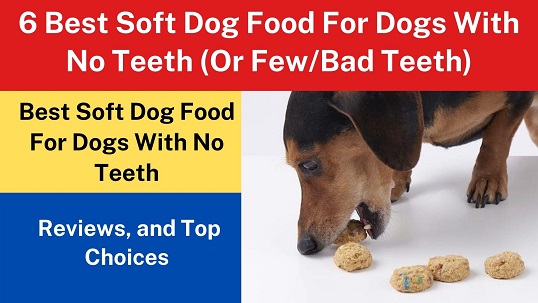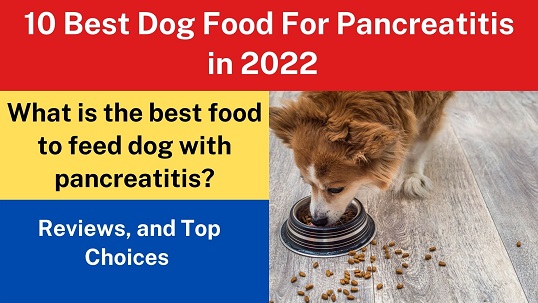Best Soft Dog Food For Dogs With No Teeth I Soft Dog Food For Dogs Without Teeth
It happens to many dogs at one time or another, especially older ones. Due to a number of problems, your puppy may start losing his teeth, making it extremely difficult for them to eat traditional kibble.
When this happens, it can be difficult to find suitable food to give to your dog, especially one that he can actually eat. With that in mind, we took a look at the best foods on the market today for dogs with bad or no teeth.
In the reviews below, we’ll show you which foods should be easy for your pup to munch on, while still being delicious and nutritious.
6 Best Dog Food for Dogs With No Teeth (or Few/Bad Teeth) Reviewed
All dog foods included in this list meet the recommended AAFCO nutrient profile guidelines for dogs. Always consult with your veterinarian before making changes to your dog’s diet.
1. Primal Nuggets Raw Freeze Dried Dog Food – Best ever
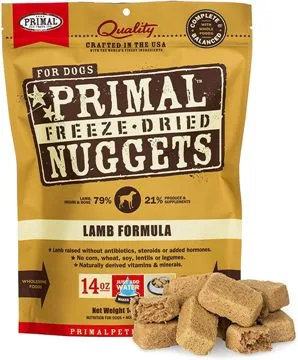
Main features –
| Flavor | Lamb Formula |
| Top ingredients | Lamb Hearts, Ground Lamb Bones, Lamb Liver, Organic Carrots, Organic Squash, |
| Item Form | Nuggets |
| Breed Recommendation | All Breed Sizes |
Reasons to suggest–
- Primal Nuggets Raw is a freeze-dried food that’s absolutely packed with nutrients, making it a fantastic dog food regardless of their dental situation.
- It’s high in protein – it’s 39%, in fact, not to mention an almost equal amount of fat. This ensures that your dog has everything he needs to keep muscles strong, while also keeping them full for longer.
- All of these nutrients come from foods like lamb hearts, liver, and ground bones, which are full of important nutrients not often found in regular kibble.
- It’s also full of organic fruits and vegetables, including high-end options like kale, blueberries, and blueberries.
- You will also see apple cider vinegar, salmon oil, and coconut oil on the list. Each is an important source of antioxidants that can do everything from boosting your dog’s immune system to fighting inflammation.
- You need to rehydrate the pieces before serving, or you can use them as a topper for regular kibble or as a gift without adding water.
- Regardless of how you serve them, they will be super soft and flaky, putting no resistance to your dog’s teeth.
- The biggest problem with Primal Nuggets Raw is the price. This is expensive food, but given all the benefits it offers, we should say it’s worth every penny.
2. Dehydrated dog food from honest cooking
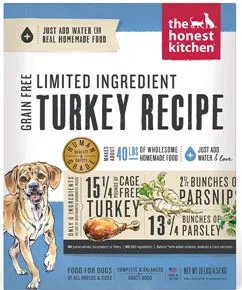
Main features –
| Flavor | Chicken |
| Top ingredients | Veterinary |
| Item Form | Kibble |
| Breed Recommendation | All Breed Sizes |
Reasons to suggest–
- The Honest Kitchen Whole Grain isn’t just a good choice for dogs with tooth problems – it’s an excellent food for any dog, period.
- It differs from most kibble in that it is a dehydrated food that swells when water is added. As a result, the bag yields a lot more than you think: every pound of dehydrated food makes 4 pounds of regular food.
- So while this food is expensive, it’s not as bad as you might have suspected at first. All in all, it’s the best dog food for dogs with bad teeth or no teeth for the money. However, it’s a bit of a pain to prepare for.
- The ingredient list is impressive. Start with turkey, and after that, you’ll find organic oats and flax seeds, carrots, cabbage, apples, and more. Better yet, all the ingredients are easily recognizable, so you can actually see that you are feeding your dog real, high-quality food.
- Best of all, though, it’s incredibly soft and mellow. Your dog should be able to devour him without any problems, even if he has bad or missing teeth.
- All in all, The Honest Kitchen Whole Grain is one of the best foods around and is especially good for dogs with dental problems.
3. Purina Beneful Wet Dog Food
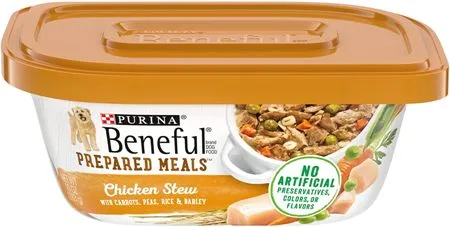
Main features –
| Flavor | Chicken Stew |
| Top ingredients | Chicken, Wheat Gluten, Liver, Rice, Meat By-Products, |
| Item Form | Stew, Blended, Broth, Chunks, Gravy, Grilled, Morsels |
| Breed Recommendation | All Breed Sizes |
Reasons to suggest–
- If you want something soft yet nutrient-rich to start your pup, Purina Beneful is an excellent choice.
- It’s a wet food that comes in an easy-to-reseal container, so you can give it to your puppy with minimal effort.
- Everything is swimming in the chicken broth which makes it extremely likely that your dog will enjoy the taste.
- The proteins are all of high quality, like real chicken and liver, and provide your growing dog with many nutrients that are important for growing healthy and large.
- The pieces of meat are extremely soft, so your pup should have no problem chewing them. Even an older dog can eat it without any problems.
- There are quality fruits and vegetables, such as peas, carrots, and barley, in each serving and you can clearly recognize them.
- This gives you the assurance that you are feeding your dog real food rather than some sort of chemical concoction.
- Unfortunately, this food contains questionable ingredients. You’ll find inexpensive fillers like wheat gluten, modified corn starch, and soy flour. Not only are they full of empty calories, but they can be difficult for some dogs to digest.
- There is also some salt in each container which is not ideal for growing dogs. However, if you are looking for soft food to give to your pup, Purina Beneful is a good choice.
4. Blue Buffalo Recipe Canned Dog Food
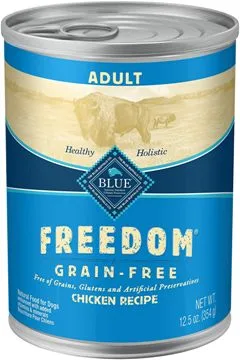
Main features –
| Flavor | Chicken |
| Top ingredients | Chicken, Chicken Broth, Chicken Liver, Carrots, Peas, |
| Item Form | Wet |
| Breed Recommendation | All Breed Sizes |
Reasons to suggest–
- Blue Buffalo is a dog food company famous for its low-ingredient foods, and although its Homestyle recipe has a longer ingredient list than most of its options, everything inside is of high quality.
- This is a pate-style food, so you won’t see chunks of natural ingredients like with some of the other options on this list.
- You will just have to trust that it is full of chicken, liver, broth, and fruit and vegetables as it says on the can.
- Among those quality fruits and veggies are things like carrots, sweet potatoes, oatmeal, and flax seeds, which give your dog plenty of nutrients with every bite.
- However, it’s a runny formula, so it can be messy to make. This acidity is also due to the high oil content in this food, which can help make your pet chubby.
- It has an extremely strong smell. That might make it more attractive to your dog, but it doesn’t make things fun for you.
- All in all, Blue Buffalo Homestyle Recipe is good canned food, but it needs to make a few tweaks if it is to become great.
5. Merrick Lil’Plates Mini Medley wet dog food
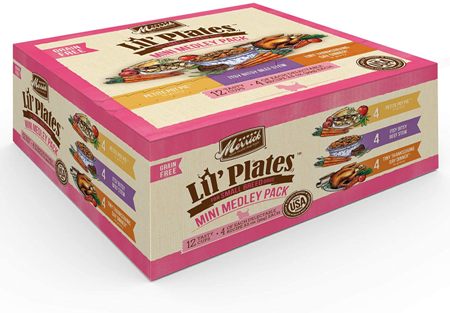
Main features –
| Flavor | Beef |
| Top ingredients | Grain-Free |
| Item Form | Chunks in Gravy |
| Breed Recommendation | Small Breeds |
Reasons to suggest–
- You won’t find enough food in Merrick Lil’Plates Mini Medley to feed a medium-sized or larger dog. However, if you have a small puppy, this is a choice worth considering.
- Each flavor is filled with meat swimming in the broth, so it should be tender and palatable to your dog. Most puppies also appreciate the variety in each box.
- One problem you may encounter is the difficulty in opening packages. Owners with arthritis or similar conditions may have difficulty opening containers and may prefer a can or other traditional packaging. Juice can also fly everywhere when you finally open one.
- It is heavy on potatoes too. Many dogs have trouble digesting potatoes and don’t add much in the way of nutrition. We’d also like to see more omega-fatty acids in each container.
- Merrick Lil’Plates Mini Medley is a useful option for small breeds with dental problems, but it has some annoying qualities that make it difficult to recommend some of the products listed above.
6. Pedigree Choice CUTS in Gravy Adult Canned Wet Dog Food
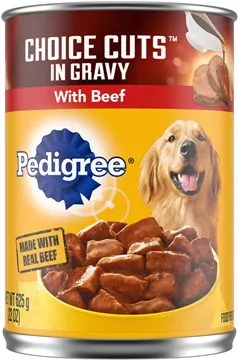
Main features –
| Flavor | Beef |
| Top ingredients | Beef, Chicken, Mear by-product, Wheat flour, Wheat Gluten |
| Item Form | Gravy |
| Breed Recommendation | All Breed Sizes |
Reasons to suggest–
- Pedigree Choice Cuts is easily the most ubiquitous option on this list, as you can find it in grocery stores and large boxes across the country. It is also quite inexpensive.
- We love that it is filled with large, tender pieces of beef. This causes most dogs to turn it down, but the pieces may be too large for smaller dogs to chew comfortably.
- The recipe is also full of questionable ingredients. The inclusion of meat by-products is one of the biggest red flags, as it indicates that the formula uses low-quality meat to keep prices down.
- It is also full of fillers such as grain; again, this is likely a cost-cutting measure. However, your dog’s digestive tract may pay the price for Pedigree’s frugality.
- There are artificial flavors inside, presumably to mask the flavor of the meat by-products. However, those are unnecessary chemicals that you would put in your dog’s body.
- Pedigree Choice Cuts are an affordable option that most dogs love. If giving your dog a healthy meal is high on your priority list, though, you should probably choose another food.
Buying Guide
Watching your dog struggle to eat due to tooth problems can be excruciating.
Fortunately, there are things you can do to make your puppy’s life easier and we’ll cover the important strategies in this guide.
What does it mean if my dog loses his teeth?
- It depends on a variety of factors, including how old your dog is.
- If you have a puppy that is losing its teeth, there is probably nothing to worry about; just like humans, puppies have baby teeth, called baby teeth, which fall out after a certain period of time. As long as their grown teeth fit in smoothly, finding lost puppy teeth is not a cause for concern.
- If your adult dog is losing his teeth, however, it is a sign that something is wrong. If your dog hasn’t suffered any mouth trauma recently, the most common culprit is advanced periodontal disease.
- Sometimes dogs break or lose their teeth for other reasons, such as chewing on something hard. If so, take your dog to the vet and take the tooth with you; your doctor may be able to replace it.
- Regardless of why your dog is losing his teeth, you should have him get a thorough dental examination from his doctor. They may be in a lot of pain and there may be things you can do to help them.
Does that mean I’m a bad owner if my dog has periodontal disease?
- At all. It is estimated that over 2/3 of adult dogs suffer from some form of periodontal disease; in fact, it is the most common disease that affects dogs.
- However, this does not mean that periodontal disease should be ignored. You can prevent this by brushing your dog’s teeth regularly, and taking special care to remove plaque along the gumline.
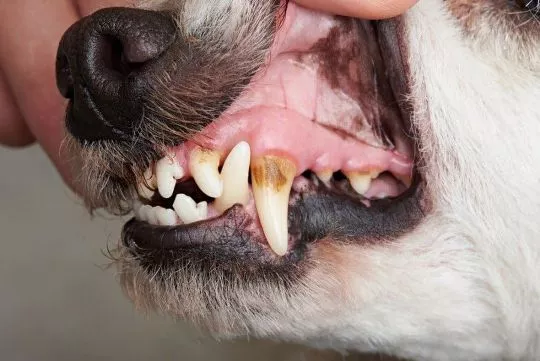
What are the causes of periodontal disease?
- If you don’t brush your dog’s teeth regularly, plaque and food bits will build up along the gums. Over time, this plaque will form something called a calculus, which presumably gets that name because it’s incredibly difficult.
- Your puppy’s immune system will try to fight off the plaque, causing the gums to become inflamed.
- This leads to an even greater amount of trapped plaque and, eventually, the gums will detach from the teeth, leaving pockets that are hotbeds for bacterial growth.
- Those bacteria will lead to abscesses and deterioration of teeth and bones, causing the teeth to loosen and fall out.
- Some dogs are more prone to periodontal disease than others, but because it is often caused by years of buildup of plaque and tartar buildup, older dogs are especially vulnerable.
- Toy breeds can also be prone to periodontal disease, as they have many teeth in their little mouths. Having crowded teeth can greatly increase a dog’s risk of periodontal disease later in life.
Is there anything I can do to stop periodontal disease?
- The best thing to do is to prevent periodontal disease before it starts by brushing your dog’s teeth regularly and making sure they get regular cleanings. However, if that ship has sailed, it doesn’t mean that you are powerless to help your dog.
- You will need to take your dog to a canine dentist. The dentist will perform X-rays to determine the extent of the damage and may prescribe antibiotics to clean up the bacterial pockets.
- From there, it will depend on how advanced the disease is. If it’s still in the early stages, simple cleaning and polishing may be all your dog needs to get back on track.
- If the disease has advanced to later stages, however, more extensive treatments, such as planning or tooth removal, may be required.
- The dentist may also recommend opening the gums to clean the roots of your dog’s teeth, then reseal them and give your dog bone growth stimulants to stimulate healing.
- All of this can be time-consuming and invasive, not to mention expensive. We understand that your dog is worth it, but you are much better off taking the time to brush his teeth regularly instead of waiting for a dentist to work wonders.
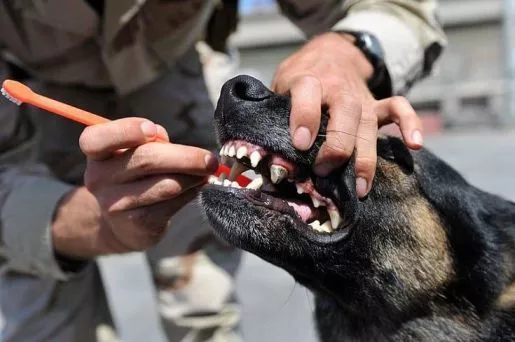
If my dog has lost his teeth, what should I look for when buying him new food?
- Just because your dog has lost his teeth doesn’t mean his life is over. You still need to feed them and they will probably still be interested in eating.
- However, crunchy kibble will likely be a thing of the past. That doesn’t mean you can’t buy and serve them dry food, especially if there’s one they particularly like, but you won’t be able to serve them straight from the bag anymore. Instead, you’ll need to mix it with water, gravy, or other moisture to soften it.
- Many owners switch their dogs to wet foods because they are easier for toothless dogs to eat. Your pup can easily swallow a pate or stew of some kind, so canned food is an excellent option.
- However, keep in mind that wet food usually has more calories than dry food, so pay attention to portion control, as you don’t want to make your dog fat in the process.
- Also, wet food will not clean your dog’s teeth as they eat like dry kibble. If you pass your dog on a wet food diet, we recommend that you pay special attention to brushing.
- You may want to feed your dog a raw diet as well, as long as the cuts of meat are tender and easy to chew.
- Raw meat is rich in enzymes that fight bacteria, which can help reduce the spread of periodontal disease. It may be enough to allow your puppy to keep all of his remaining teeth.
How do I brush my dog’s teeth?
- Now that you understand the importance of brushing your mongrel dog’s teeth regularly, there’s just the small matter of figuring out how to actually do it. This can be difficult, especially if you have an uncooperative puppy on your hands.
- The first thing you need is a special toothbrush and toothpaste designed specifically for dogs.
- Once you have the equipment, you can start acclimating your dog to them slowly; start by having them smell the toothbrush and lick the toothpaste off. Keep everything light and relaxed; do not scare or pressure your dog in any way.
- Once they are comfortable with the toothbrush, start gently massaging the gums with just one finger (you can add peanut butter to your finger if your dog doesn’t seem to like this step).
- You’re simply trying to acclimate them to having something in their mouth, as well as get them used to the circular brushing sensation.
- After a few finger brushing sessions, switch to your toothbrush and toothpaste.
- Lift your dog’s lips and gently scrub his teeth and gums in a circular motion as you angle the bristles towards the gum line.
- If you notice spots where plaque has built up, pay special attention to them, but don’t brush too hard or you will scare your dog.
Last Note–
Friends, I hope You must have liked the blog “6 Best Soft Dog Food For Dogs With No Teeth (Or Few/Bad Teeth)“
If you have any feedback, then definitely tell us by going to Contact Us, you can email me or follow me on social media Will see you soon with a new blog, till then stay tuned to my blog “Thanks
